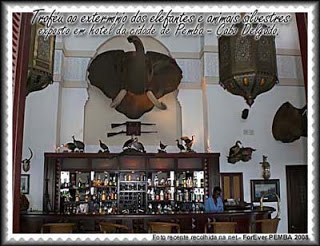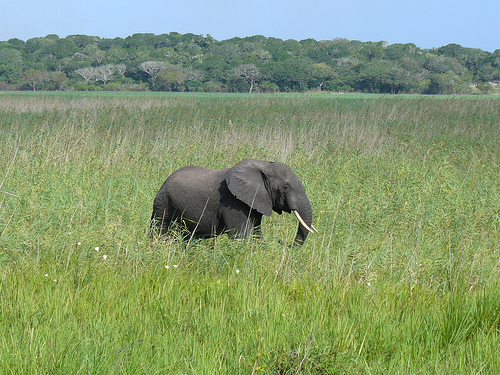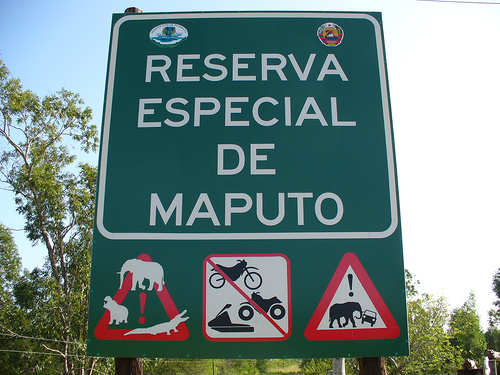A news report published by the newspaper @Verdade [pt] at the end of October 2012, unmasks illegal hunting of elephants in the Mareja Reserve, in the Northern region of Mozambique, in Cabo Delgado. According to the article, the “massacre” is perpetrated by groups of “sophisticatedly armed” poachers and has taken on “gigantic proportions”:
Todas as semanas, pelo menos, dois animais são abatidos, dos quais são retiradas as pontas de marfim, que são posteriormente vendidas no mercado negro. A batalha acontece aos olhos das autoridades governamentais e policiais locais que, por conforto e cumplicidade, não agem.
Every week at least two animals are shot dead, from whom ivory tips are extracted, which are then sold on the black market. The battle takes place in the eyes of government officials and local police who, for comfort and complicity, do not act.
Noise of gunshots is frequently heard and then helicopters or aircrafts are seen flying over the reserve. These serve to load the ivory taken from the animals in danger of extinction, and to facilitate the trafficking of a product that “reaches exorbitant prices on the black market”, and is exported to Asian countries like China, North Korea, Thailand and the Philippines.
A comment [pt] left by Conor Christie through Facebook adds:
Trabalhei um pouco na coutada 4 na provincia de Manica e quando la, fomos avisados que os caçadores vêm das zonas da Beira e vêm BEM EQUIPADOS. Nós tinhamos o equivalente dos guardas das Quirimbas, e fomos avisados para nao confrontar os elementos. As pessoas que tem [acesso] a esse tipo de armamentos não são os camponeses. Quando lá, sabiamos que [caçadores] furtivos alugavam AK47 (AKM) do comando do Save. Compravamos balas por mil Met [$33 USD] cada, indicando que o [acesso] às armas é fácil. Na minha opinião, as pessoas atrás dessas mortes nas Quirimbas sao pessoas com patencia [sic].
I worked for a while at the 4th warren in the Manica province, and we were warned that the hunters come from the Beira region and they come WELL EQUIPPED. We had the equivalent of what the guards of Quirimbas had, and were told not to confront them. People who have access to that kind of weaponry are not peasants. While we were there, we knew that poachers rented AK47 (AKM) from the Save's command. We bought bullets for one thousand Meticais [$33 USD] each, which indicates that access to arms is easy. In my opinion, people behind those deaths in Quirimbas are people with patency [sic].
Another reader of the newspaper, Kita Chilaule, expressed her indignation [pt]:
Nao acredito que nao hajam formas de travar estes cacadores furtivos. Penso que eles nao sao um numero superior aos guardas mas sim tem a proteccao do governo local ate pork esta claro que existe aqui uma cumplicidade e currupcao. o lamentavel e a destruicao do patrimonio do ecoturismo desta zona.
I can't believe there aren't any ways to stop these poachers. I think they are not a bigger number than the guards but yes they have the protection of the local government even because it is clear there is complicity and corruption here. The destruction of eco-tourism heritage in this area is regrettable.
And she continues [pt]:
Esses caçadores a maioria sao estrangeiros nao podem ter poder de accao mais que os Nacionais. Peco a quem e de direito pra travar esta pratica degradante de fauna bravia.
Those hunters, the majority are foreigners [and] cannot have more power of action than the Nationals. I ask whoever owns the rights to stop this practice of wildlife degradation.
Included in the Quirimbas National Park [pt], which occupies an approximate area of 7,506 square kilometres, Mareja's Reserve is surveilled by a group of 10 forest guards precariously equiped to face poaching. On the website of the Associação de Camponeses de Mareja (Mareja's Peasants Association) there is an ongoing awareness and fundraising campaign to strengthen the work of elephant protection.
[The video above was made by Dominik Beissel; more footage of elephants in their natural habitat can be seen here.]
Following the news published by @Verdade, an online petition [pt] was launched on Avaaz:
solicita-se a atenção do mundo que preza a sustentabilidade ecológica e a vida nas florestas, assim como do GOVERNO DE MOÇAMBIQUE, para que providências sejam tomadas de forma a acabar com o extermínio dos elefantes em Moçambique.
We seek the attention of a world that values ecological sustainability and life in the forests, as well as the GOVERNMENT OF MOZAMBIQUE so that measures are taken to stop the killing of elephants in Mozambique.
“Man-Elephant Conflict”
Since 2006 the author of the blog Forever Pemba, Jaime Luis, has reported [pt] on conflicts concerning wildlife, especially elephants, in that region:

Trophy for the extermination of elephants and wild animals, displayed in a hotel in the city of Pemba – Cabo Delgado. Photo Blog Forever Pemba (used with permission)
Nos últimos tempos, os animais, principalmente elefantes, matam pessoas, criando insegurança nas comunidades, assim como se lhes acusa de fomentarem, com macacos e porcos selvagens, a fome, ao destruírem parcial ou completamente as culturas.
In recent times, the animals, especially elephants, are killing people, creating insecurity within communities, as well as being accused of fomenting – together with monkeys and wild pigs -, hunger, due to partially or completely destroying crops.
Criticizing the implementation [pt] of some of the “stagnation measures” of the “destruction” caused by the animals, promoted by local authorities, such as the training of community hunters, Luis comments on a news story [pt] published by the Notícias newspaper in 2007:
Em resumo e lendo o texto, entende-se que, as autoridades responsáveis em Cabo Delgado, depois de apresentarem os elefantes e outros animais como inimigos perigosos para o ser humano, agirão, como afirmam com um tom beatificante, quase piedoso, para não dizer cínico.
To sum up upon reading the text, one understands that the responsible authorities in Cabo Delgado, after presenting the elephants and other animals as dangerous enemies to human beings, will act as they say with a beatific tone, almost godly, not to say cynical
The website of WWF-Mozambique indicates [pt] that in 1999 the National Directorate of Forests and Wildlife from the Ministry of Agriculture and Rural Development published the National Strategy of Elephant Management in Mozambique, with the definition of targets for the conservation of a population of around 18,000 african elephants living in the country. However, the execution of the convention, according to a report from September 2012, proves to be deficient [pt].









2 comments